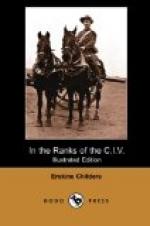September 27 was a red-letter day. News came that all the C.I.V. were going home on the following Monday. I was overwhelmed with congratulations in the barrack-room. I exercised the Captain’s Argentine in the afternoon, and visited the station, where I learnt that the Battery had been wired for, and had arrived, but was camped somewhere outside.
On the next day I got another charwoman-clerk appointed, said good-bye to my R.A. friends and the Captain, who congratulated me too, and was free to find the Battery and rejoin. After some difficulty, I found them camped about four miles out, close to the C.I.V. Infantry. It was delightful to walk into the lines, and to see the old familiar scenes, and horses, and faces. Every one looked more weather-beaten and sunburnt, and the horses very shaggy and hard-worked, but strong and fit. My mare had lost flesh, but was still in fine condition. The Argentine was lashing out at the others in the same old way. Tiny, the terrier, looked very weary and travel-stained after much forced marching, which she had loyally undergone to the last. Jacko had not turned a hair.
Williams turned up with “Pussy” in a lather, having been hunting for me all round Pretoria. We ate bully-beef and biscuit together in the old style. I took my pair down to water for the last time, “for auld lang syne,” and noticed that the mare’s spine was not the comfortable seat it used to be.
Then the last “boot and saddle” went, and they were driven away with the guns and waggons to the station, and thence to the remount depot, to be drafted later into new batteries. Ninety-four horses were handed over, out of a hundred and fourteen originally brought from England, a most creditable record.
The camp looked very strange without the horses, and it was odder still to have no watering or grooming to do. In the evening, the change from barrack-room to veldt was most delightful. We made a fire and cooked tea in the old way, and talked and smoked under the soft night sky and crescent moon. Then what a comfortable bed afterwards! Pure air to breathe, and plenty of room. I felt I had hardly realized before how pleasant the veldt life had been.
The Battery had done a great deal of hard work since I left; forced marches by night and day between Warmbad, Pynaar’s River, Waterval, Hebron, Crocodile River, and Eland’s River; generally with Paget, once under Colonel Plumer, and once under Hickman. They had shared in capturing several Boer laagers, and quantities of cattle. When they left the brigade, a commando under Erasmus was negotiating for a surrender, which was made a day or two later, as we afterwards heard. Altogether, they had done very good work, though not a round was fired. I only wish I could have been with them.
One thing I deeply regret missing, and that was Paget’s farewell speech to us, when all agree that he spoke with real and deep feeling. One of our gunners took it down in shorthand, and here it is:—




